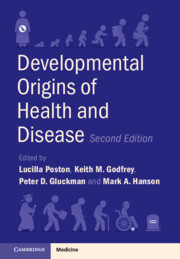Book contents
- Developmental Origins of Health and Disease
- Developmental Origins of Health and Disease
- Copyright page
- Contents
- Contributors
- Preface
- Section I Overview
- Section II Exposures Driving Long-Term DOHaD Effects
- Section III Outcomes
- Section IV Mechanisms
- Section V Interventions
- Section VI Public Health and Policy Implications of Interventions
- Chapter 19 Education and Science Communication
- Chapter 20 DOHaD: Engaging with New Global Issues to Inform Policy
- Index
- References
Chapter 19 - Education and Science Communication
Translation of DOHaD Evidence for Health Benefit
from Section VI - Public Health and Policy Implications of Interventions
Published online by Cambridge University Press: 01 December 2022
- Developmental Origins of Health and Disease
- Developmental Origins of Health and Disease
- Copyright page
- Contents
- Contributors
- Preface
- Section I Overview
- Section II Exposures Driving Long-Term DOHaD Effects
- Section III Outcomes
- Section IV Mechanisms
- Section V Interventions
- Section VI Public Health and Policy Implications of Interventions
- Chapter 19 Education and Science Communication
- Chapter 20 DOHaD: Engaging with New Global Issues to Inform Policy
- Index
- References
Summary
Education and science communication offer important tools in facilitating increased awareness and application of DOHaD evidence at the level of government, agencies, communities, families and individuals. In this chapter we examine the nature of education and science communication, and their potential to promote application of DOHaD evidence within processes of knowledge translation. We outline opportunities where education and knowledge translation may contribute to the promotion of understanding and application of the concept of investing in the early-life environment to promote health and wellbeing in current and future generations. We argue that greater investment in the potential for knowledge translation is required to facilitate the potential of DOHaD evidence to contribute towards improved global health.
- Type
- Chapter
- Information
- Developmental Origins of Health and Disease , pp. 203 - 212Publisher: Cambridge University PressPrint publication year: 2022
References
- 1
- Cited by

